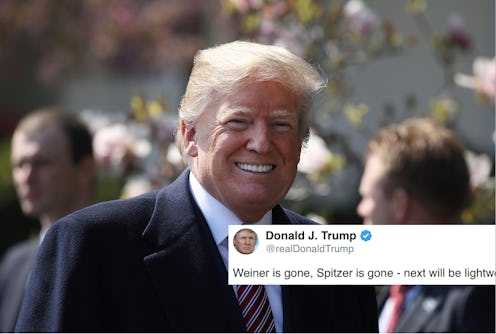News
Why This Old Trump Tweet About Eric Schneiderman Is Raising Eyebrows Years Later

Days after New York Attorney General Eric Schneiderman resigned under allegations that he physically abused several women (allegations he denies) reports are surfacing that Donald Trump may have known about Schneiderman's abuse allegations for years before they became public. A cryptic 2013 tweet from Trump hinted that Schneiderman had a scandal looming over his head, and Bloomberg reported Thursday that Trump's lawyer Michael Cohen got wind of the allegations that same year and informed his client about them. Bustle has reached out to Schneiderman and the White House regarding the new reports.
Schneiderman denies the abuse allegations, which The New Yorker reported on Sunday, saying in a statement:
In the privacy of intimate relationships, I have engaged in role-playing and other consensual sexual activity. I have not assaulted anyone. I have never engaged in nonconsensual sex, which is a line I would not cross.
On Friday, an attorney for two women who claim that Schneiderman was "sexually inappropriate" with them wrote a letter to U.S. Southern District Court Judge Kimba Wood, who is overseeing a separate, ongoing investigation against Cohen. That attorney, Peter J. Gleason, says in the letter that he discussed the abuse allegations with Cohen in 2013; federal agents seized records from Cohen's office in April, and in the letter, which The New York Times published a copy of, Gleason asked Wood for an order protecting any of those records that concern the women he represents.
Gleason writes in the letter that after the two women told him about their experiences with Schneiderman, he discussed the matter with retired journalist Stephen Dunleavy, who in turn suggested bringing it up with Trump. Gleason says that shortly thereafter, he received a phone call from Cohen, and the two talked about the allegations against Schneiderman.
Gleason told The Times that he and Cohen discussed the matter in the context of Trump running for governor of New York. Cohen told Gleason that if Trump did run for governor, he would help surface the allegations against Schneiderman, Gleason said.
"The extent of Mr. Cohen memorializing any of our communications is unknown," Gleason writes in the letter. "However, these two women's confidentiality, as victims of a sexual assault, should be superior to that of any unrelated subpoena." He is asking Wood to issue "a protective order and seal any and all correspondence that Mr. Cohen may have memorialized regarding our communications which pertain to Mr. Schneiderman's assault on these two women." Bloomberg reports that in response, Wood told Gleason to submit a formal memo to the court in support of his letter.
According to journalists Ronan Farrow and Jane Mayer, who wrote the New Yorker story, the women who approached Gleason are not the same women Farrow and Mayer cited in their report.
"We can confirm that none of our sources ever had any communications with Gleason or Cohen," Farrow tweeted on Thursday. Mayer, while discussing the Gleason report with another Twitter user, wrote that "the women we spoke to were not the same ones" who approached Gleason. In his interview with The Times, Gleason also asserted that the women he spoke with weren't those cited in the New Yorker article. If accurate, this would mean that at least six women have, in separate forums, accused Schneiderman of abusing them.
Gleason also told The Times that he'd informed elected officials in New York about the Schneiderman allegations nearly five years ago, but that his concerns were brushed off. He didn't identify these officials, but told The Times that "the highest levels of our state and city government were well aware of" the allegations.